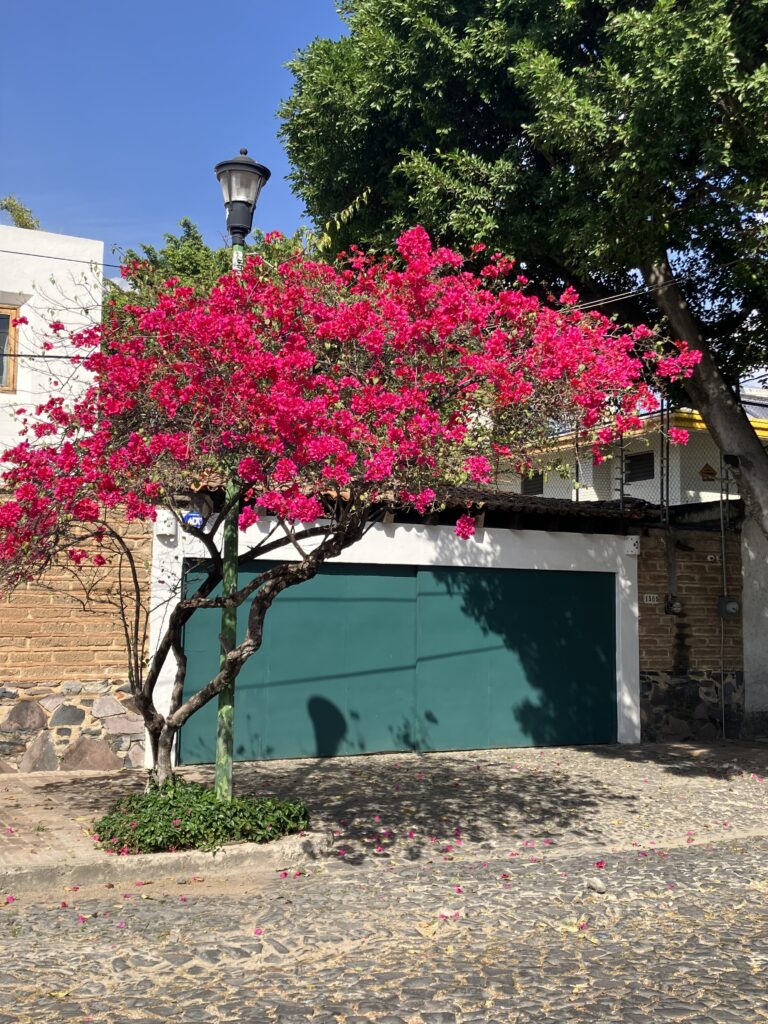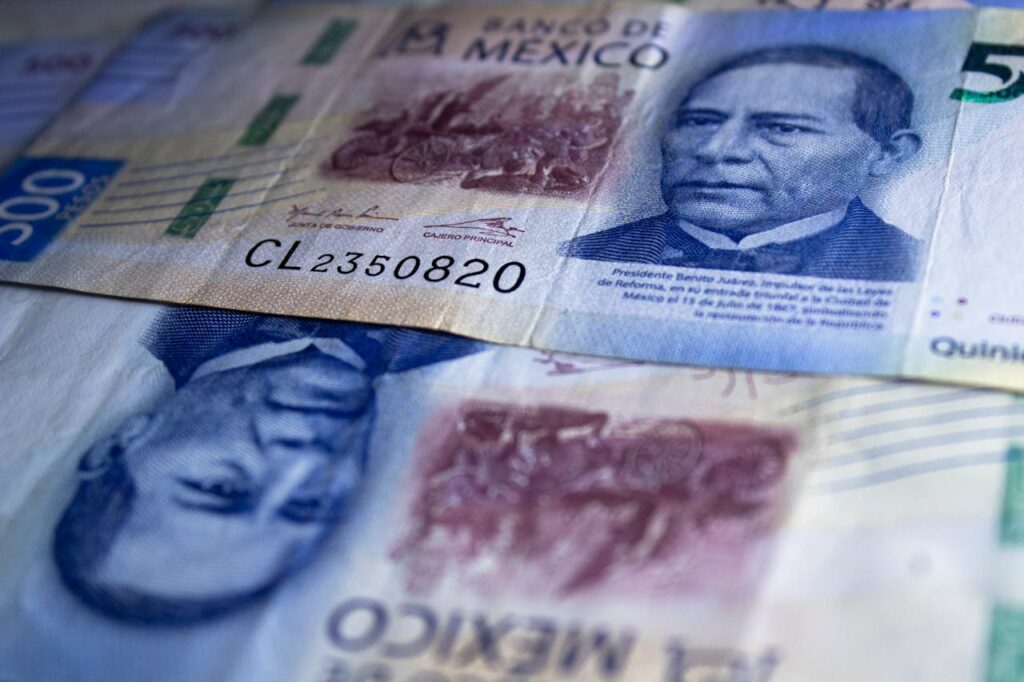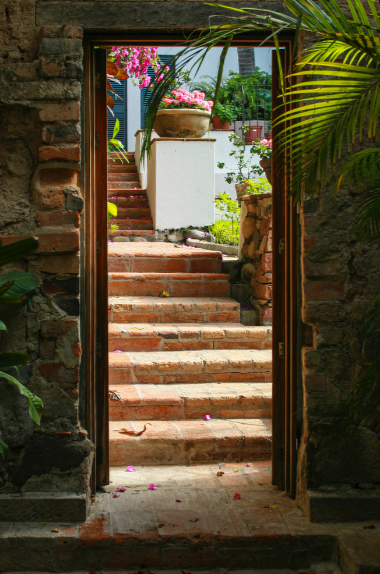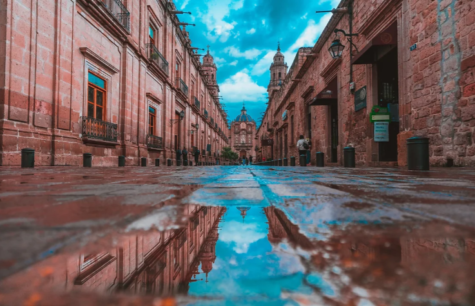If it’s always been your dream to own property in Mexico, this series will give you a window into what it takes to make that dream a reality.
Real Estate is a weighty topic, so we’ll tackle pretty much everything you need to know (and a bit more) over three posts:
Part 1 will cover the basics of buying property in Mexico as a foreigner.
Part 2 will dive into the house-hunting process, with a focus on Guadalajara.
Part 3 will share details of our experience buying a house in Zapopan in the Fall of 2022.

Overview of the Basics
Since my husband and I relocated to Mexico from Colorado in 2022, we’ve read a lot of misleading – and occasionally flat-out bad – information about who can buy real estate in Mexico, and how it’s done. Let’s review the basics now.
Who can buy in Mexico?
Regardless of what you’ve read… You don’t need to be a Mexican citizen, or even have a residency visa to buy property in Mexico. Just about anyone can buy here, as long as they’ve got the cash. That said, there are restrictions on foreign property buyers that do not apply to Mexican citizens.
Deed or Fideicomiso?
Foreign buyers can take direct possession of the deed (escritura) when the property is located more than 60 miles (100 km) from international borders and more than 30 miles (60 km) from the coasts. This rule allows foreign buyers to take direct title in Guadalajara, Mexico City, San Miguel de Allende, Queretaro, Lake Chapala, Oaxaca (city), Morelia, and many other attractive places that expats choose to call home.
On the other side, if a property is located within the restricted zone, e.g. Puerto Vallarta, Tulum, Mazatlan, Merida, and all of Baja, foreigners may still purchase but are unable to take direct possession of the deed. Instead, a bank trust (fideicomiso) holds the deed on their behalf, which is functionally the same as it names the buyer the sole beneficiary of the asset.
The process to obtain a fideicomiso is pretty straightforward. The buyer selects a bank and pays it to set up the trust, which is valid for a period of up to 50 years, at which point it can be renewed, if necessary. Set-up time is anywhere from 1-2 months.
If you haven’t yet guessed, the biggest downside to a fideicomiso is the added cost. The fee to create the trust varies from bank to bank, and is rising as foreign demand for Mexican coastal properties has surged in the past few years. It’s no surprise that Mexican banks are hot to capitalize on this lucrative trade and are jacking up their prices.

You should assume at least $2,000-$3,000 USD in fees for the initial setup and year 1 fees, and $600-$1,000 USD per year thereafter for the bank to maintain the trust for you. Fideicomiso fees vary from bank to bank, and are the buyer’s obligation. Falling behind on bank trust payments will not cause you to lose the property, but will trigger penalties and interest being added to the fees owed.
The vast majority of home sales in Mexico are paid for 100% in cash. Mortgages are not common for a couple of reasons. First, mortgage rates in Mexico are super high relative to the U.S. (about 11% vs. 7% as of August 2023), which adds significant cost over the life of the loan. Second, mortgages are hard to get in Mexico, taking 3-4 months to secure from a local bank, if you can get one at all.
Because Mexican banks are slow to approve borrowers, many sellers here simply refuse to work with buyers who need loans. And because U.S. banks will not give mortgage loans to American citizens buying property in Mexico, my advice if you cannot afford to buy in cash, is to rent instead.
If you lack the funds to do an all-cash transaction and still want to buy, one option (assuming that you have property elsewhere) is to sell your home outside of Mexico to raise the money needed. This is how we bought property in Guadalajara in 2022.
Notaries
The central figure in all real estate transactions in Mexico is the notary (notario). Unlike the U.S. where anyone with a pulse can become a notary, notarios in Mexico are lawyers with at least five years of experience.
Notarios manage all critical aspects of the deal, preparing legal paperwork, and filing the necessary documentation with the government registry in the city where you have made your purchase. They also prepare the new property deed that certifies you as the legal owner.
Real Estate Agents & Lawyers
Agents in Mexico are not currently licensed or regulated. New rules are coming later this year to establish some baseline credentials, and it remains to be seen how high the bar will be raised once they’re fully rolled out.
And while you’re NOT obligated to use an agent, quality agents (there are a few) can provide valuable insights into the local market and help you navigate a process that will not look at all familiar if your real estate experience is derived solely from up north.
After having worked with seven (!) different agents here in Guadalajara over the course of six months, my best advice is to be your own advocate. Many agents will direct you to properties they have some incentive to sell rather than those that best fit your criteria, and waste your time in the process.
Most agents have a particular niche (e.g. towers/new builds, luxury properties, commercial spaces) or neighborhood (Colonia Americana, Chapalita, etc.) they know well. So it’s best to find an agent whose knowledge aligns with your specific priorities. We learned this the hard way.
Lawyers are not required in real estate deals in Mexico but can offer tremendous value if you find yourself negotiating with developers or sellers making extreme demands. We worked with the cousin of a good friend in a challenging negotiation with an owner/developer of a new tower in Providencia. He advised us to walk away when terms could not be modified to include even minimal protections. (We took his advice)

Fees & Taxes
As a simple rule of thumb, buyers pay closing costs and sellers pay agent commissions. This is consistent with standard real estate practice in the U.S. If you find an agent who will only show you properties for a fee, you are best advised to look elsewhere as they are likely double-dipping (seeking to get paid by both sides).
Up-front fees can be steep relative to the purchase price. We were fortunate to pay roughly 2.5% in closing costs and taxes in Zapopan, a municipality on the west side of Guadalajara. Fees vary by notary, so like most things in real estate, it pays to shop around.
Fees in coastal areas are pricier due to bank trust-related expenses. In these areas they can reach as high as 6% of purchase price, so be sure to factor that into your budget.
Once you become an owner your property taxes (impuestos prediales) will seem laughable compared to the U.S. Our first-year property tax bill on a 3 bedroom, 3.5 bath home in Zapopan was a little over $300. In the U.S. we were paying close to $6,000 annually for a similarly sized home. Viva Mexico!
Property taxes are due at the beginning of the year. In Guadalajara, you have until the end of March to pay, and are given a small discount for paying early, i.e. by the end of February. There was even a ‘drive-through’ tax collection point set up across from Plaza Patria, a short distance from our house. (Most Mexicans wait until the very last minute to pay their property taxes, judging by the lines.)
Title Insurance and Escrow
Up north, escrow acts as a neutral third-party in the transfer of funds during a property transaction, safeguarding both parties’ interests. This concept is still in its infancy in Mexico, and in many areas escrow and title insurance do not exist at all.
Unless you choose to buy in places with a heavy expat concentration like San Miguel de Allende, Puerto Vallarta or Baja, you will have to come to terms with the fact that there are no local escrow or title insurance services to safeguard your purchase.
Even if you can find escrow-like services in Mexico, be aware that these companies are not regulated under Mexican law or monitored by any public authority. Caveat emptor.
Foreign Buyer Approval from the Secretaría de Relaciones Exteriores (SRE)
Regardless of where you decide to buy in Mexico, as a foreigner you are required to obtain approval to buy from Mexico’s foreign affairs ministry, which goes by the acronym SRE.
Once a buyer and seller have a signed purchase agreement, the notario handling the deal will send an email to the SRE requesting approval for foreigner(s) to buy the property in question. If you are a couple buying property jointly, approval is requested for each buyer separately.
There is only one office in the entire country processing these requests, and it is located in Mexico City. Do not expect this step to be quick, regardless of what your agent tells you.
Payment
Unless you are buying in dense expat hubs, Mexican property will be priced in pesos. This adds an extra headache for foreign buyers as they must keep a close eye on exchange rates for their impact on the purchase price, and manage the exchange rate risk if there is significant volatility.
For example, if you signed a sales agreement with the purchase price in Mexican pesos and you intend to pay in U.S. dollars, the actual cost to you when the deal closes is variable. If the dollar appreciates against the peso while your transaction is in progress, then the real purchase price goes down. If the dollar depreciates while the transaction is in progress, the real purchase price goes up. Talk about stress!
If you buy in San Miguel de Allende, Puerto Vallarta, and much of Lake Chapala, you will find many properties priced in USD and skirt this risk, assuming that you are paying in U.S. dollars.
NOTE: We’ll cover the mechanics of transferring large sums of money to Mexico in a future post.
Conclusion
You are now acquainted with the basics of buying real estate in Mexico as a foreigner. The next post in this series will discuss house-hunting in Mexico and how it differs from up north, along with insights from our recent experience in Guadalajara.

